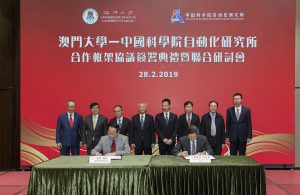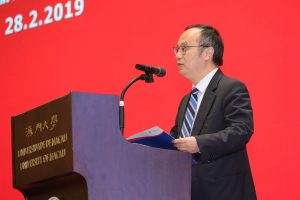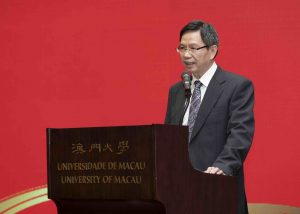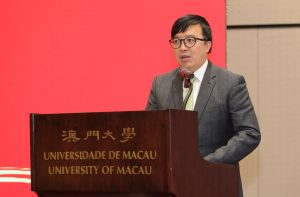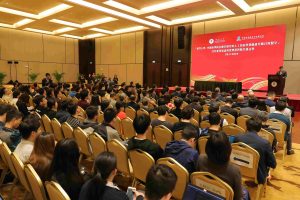The University of Macau (UM) today (28 February) held a ceremony for the signing of a collaborative framework agreement with the Institute of Automation, Chinese Academy of Sciences (CAS-IA), and a joint academic workshop. The agreement aims to maximise the research capacity of both UM and the CAS-IA in artificial intelligence (AI) and brain-inspired intelligence, promote their research development in related scientific fields, integrate their academic strengths and resources, as well as initiate innovative collaborative research in AI and brain-inspired intelligence.
The Macao SAR government’s policy to develop Macao into a smart city has created many opportunities for research development in the city. Many academic programmes offered by UM’s Faculty of Science and Technology (FST) have distinctive characteristics and experienced rapid development in recent years. Over the years, the FST has assembled a strong faculty team with international influence and has produced many exemplary graduates. The faculty has also received recognition from the Ministry of Science and Technology and the Macao Science and Technology Development Fund for its research achievements. In July 2018, UM received approval to establish the State Key Laboratory of the Internet of Things for Smart City.
In recent years, countries around the world have become increasingly aware of the importance of AI technology. AI is a discipline that encompasses many areas, including smart city technology, manufacturing, and healthcare. UM attaches great importance to AI development and has initiated research studies on importance scientific questions in the field. So far, the university has achieved impressive results in areas such as pattern and image recognition, classification, and object tracking and recognition. In order to facilitate the studies of AI theories and applications for the benefit of Macao and mankind at large, UM in this January established an AI research centre. In addition to theories and algorithms, the centre focuses on the application of AI technology in machine translation, smart tourism and gaming, and smart healthcare.
The CAS-IA is the oldest national research institute in the field of automation in China. Over the years, the institute has achieved world-class results and has produced many professionals in the field. It also enjoys a leading position in the areas of pattern recognition and complex systems.
During the ceremony, Yonghua Song, rector of UM; Liu Chenglin, vice president of the CAS-IA; and Ma Chi Ngai, president of the Administrative Committee of the Science and Technology Development Fund, each delivered a speech. Ge Wei, vice rector (research) of UM; and Liu Chenglin, signed a collaborative framework agreement on behalf of their institutions, signalling the beginning of a collaborative relationship between UM and the CAS-IA. Both parties will carry out innovative collaborative research on AI and brain-inspired intelligence, with the support of their research facilities and researchers, and will push forward the plan to establish a joint lab. They will also create a high-quality platform for collaborative research, strengthen exchange and collaboration among researchers, and promote the commercialisation of research results, in order to enhance the competitiveness of the science and technology industry in the Greater Bay Area.
Song hopes that the collaboration will help to create a high-quality platform for collaborative research in AI and provide an opportunity for both institutions to combine their strengths and resources, in order to achieve joint development and contribute to AI development in Macao and China.
A joint workshop was held after the agreement signing ceremony. Both parties reported their latest research results. Associate Professor Wong Fai from the Department of Computer and Information Science explained how UM-CAT, a UM-developed translation platform based on AI technology, can assist translators and their team members in the translation, proofreading, and management of translation projects. Liu provided updates on the progress of research projects in the National Laboratory of Pattern Recognition under the CAS-IA. Jia Weijia, deputy director of UM’s State Key Laboratory of the Internet of Things for Smart City and director of the Centre for Data Science, shared UM’s research progress in AI and the Internet of Things for smart cities. Hou Zengguang, deputy director of the State Key Laboratory for Management and Control of Complex Systems under the CAS-IA, provided updates on the progress of the lab’s research projects.
Other guests attending the ceremony were Wang Xindong, secretary general of the Liaison Office of the Central People’s Government in the Macao SAR; Lam Kam Seng, chair of the UM University Council; Sou Chio Fai, director of the Higher Education Bureau of the Macao SAR; Jiang Tianzai, director of the Brainnetome Center, CAS-IA; Wei Qinglai, deputy director of the State Key Laboratory for Management and Control of Complex Systems, CAS-IA; as well as many teachers and students from local high schools, UM students, faculty members, and local professionals in related fields.
Source: Communications Office
Media Contact Information:Communications Office, University of Macau
Albee Lei Tel:(853) 88228004Kelvin U Tel:(853) 88224322Email:prs.media@um.edu.mo
UM Website:www.um.edu.mo

